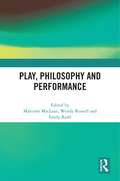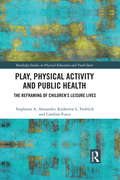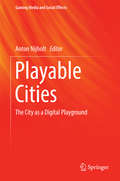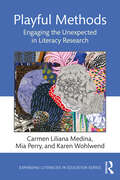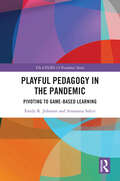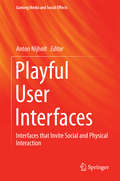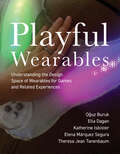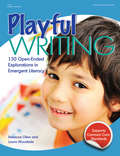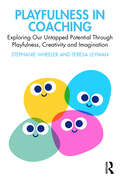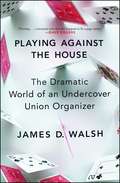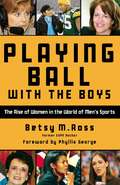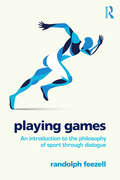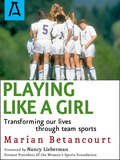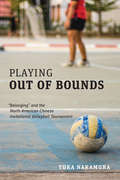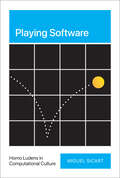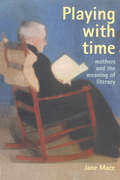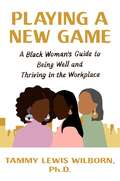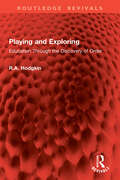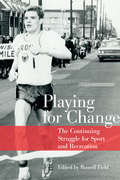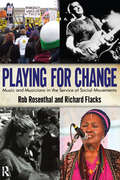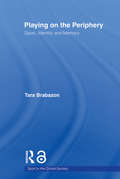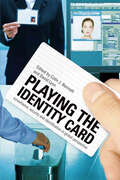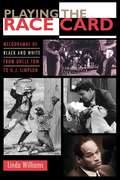- Table View
- List View
Play, Philosophy and Performance
by Emily Ryall Wendy Russell Malcolm MacLeanPlay, Philosophy and Performance is a cutting-edge collection of essays exploring the philosophy of play. It showcases the most innovative, interdisciplinary work in the rapidly developing field of Play Studies. How we play, and the relation of play to the human condition, is becoming increasingly recognised as a field of scholarly inquiry as well as a significant element of social practice, public policy and socio-cultural understanding. Drawing on approaches ranging through morality and ethics, language and the nature of reality, aesthetics, digital culture and gaming, and written by an international group of emerging and established scholars, this book examines how our performance at play describes, shapes and influences our performance as human beings. This is essential reading for anybody with an interest in leisure, education, childhood, gaming, the arts, playwork or many branches of philosophical enquiry.
Play, Physical Activity and Public Health: The Reframing of Children's Leisure Lives (Routledge Studies in Physical Education and Youth Sport)
by Stephanie A. Alexander Katherine L. Frohlich Caroline FuscoAre children playing less than they used to? Are rising obesity rates linked to a decline in children’s time to play freely? These and other related questions have filled the pages of newspapers, magazines and scholarly journals for the past decade. Researchers and journalists have attributed these issues to societal changes around children’s lives and leisure, the growth of structured and organised activities and increasing perceptions of risk in children’s play. Play, Physical Activity and Public Health presents a discussion of the way modern notions of play are rendering children’s leisure activities less free and less engaged in simply for fun. Based on original qualitative research, and analysis of contemporary media from Canada and elsewhere, this book argues that the growing health concerns around childhood play entail a paradox: by advocating, promoting, discussing, and re-directing children’s play, a new form of children’s leisure is emerging - one that is purpose-driven, instrumentalised for health, and ultimately, less free. We explore how play has become goal-oriented, a means to health ends, and how the management of pleasure in play as well as diverse risk discourses around play continue to limit and constrain possibilities for children and families to play and engage in leisure freely. Incorporating past critiques of this trend in play, we argue for research and practice to create new possibilities and ways of thinking about children's play, leisure, fun and childhood, that are less constrained and managed, and importantly less geared towards health goals. This is a valuable resource for students of the sociology of sport, kinesiology, sports and health psychology, education, public health, and childhood studies. It is also an important read for school teachers, public health practitioners, psychologists, physical education teachers, academics and parents interested in how children’s leisure lives are being shaped by the growing and diverse discussions around play.
Playable Cities
by Anton NijholtThis book addresses the topic of playable cities, which use the 'smartness' of digital cities to offer their citizens playful events and activities. The contributions presented here examine various aspects of playable cities, including developments in pervasive and urban games, the use of urban data to design games and playful applications, architecture design and playability, and mischief and humor in playable cities. The smartness of digital cities can be found in the sensors and actuators that are embedded in their environment. This smartness allows them to monitor, anticipate and support our activities and increases the efficiency of the cities and our activities. These urban smart technologies can offer citizens playful interactions with streets, buildings, street furniture, traffic, public art and entertainment, large public displays and public events.
Playful Methods: Engaging the Unexpected in Literacy Research (Expanding Literacies in Education)
by Mia Perry Carmen Liliana Medina Karen WohlwendThis book introduces three new subjects to the context of literacy research—play, the imaginary, and improvisation—and proposes how to incorporate these important concepts into the field as research methods in order to engage people, materials, spaces, and imaginaries that are inherent in every research encounter. Grounded in cutting-edge theory, chapters are structured around lived narratives of research experiences, demonstrating key practices for unsettling and expanding the ways people interact, behave, and construct knowledge. Through an exploration of difference, play, and the imaginary, authors Medina, Perry, and Wohlwend present an active set of practices that acknowledges and attends to the global, fragmented, politicized contexts in literacy research. This book provides researchers and literacy education scholars with rich and clear theoretical foundations and practical tools to engage in literacy research in ethical, creative, and responsive ways. The authors invite readers to play by exploring the ways in which pedagogical, research, artistic, and other creative contexts can be sites to examine identity, plurality, and difference. Chapters feature innovative elements such as author dialogues that make visible how the authors engage with the ideas they present; guiding questions to prompt reflection and conversation; playful invitations to share possibilities of play in real-world contexts; and stories and practices to ground the conceptual and playful inquiry.
Playful Pedagogy in the Pandemic: Pivoting to Game-Based Learning (The COVID-19 Pandemic Series)
by Anastasia Salter Emily K. JohnsonEducational technology adoption is more widespread than ever in the wake of COVID-19, as corporations have commodified student engagement in makeshift packages marketed as gamification. This book seeks to create a space for playful learning in higher education, asserting the need for a pedagogy of care and engagement as well as collaboration with students to help us reimagine education outside of prescriptive educational technology. Virtual learning has turned the course management system into the classroom, and business platforms for streaming video have become awkward substitutions for lecture and discussion. Gaming, once heralded as a potential tool for rethinking our relationship with educational technology, is now inextricably linked in our collective understanding to challenges of misogyny, white supremacy, and the circulation of misinformation. The initial promise of games-based learning seems to linger only as gamification, a form of structuring that creates mechanisms and incentives but limits opportunity for play. As higher education teeters on the brink of unprecedented crisis, this book proclaims the urgent need to find a space for playful learning and to find new inspiration in the platforms and interventions of personal gaming, and in turn restructure the corporatized, surveilling classroom of a gamified world. Through an in-depth analysis of the challenges and opportunities presented by pandemic pedagogy, this book reveals the conditions that led to the widespread failure of adoption of games-based learning and offers a model of hope for a future driven by new tools and platforms for personal, experimental game-making as intellectual inquiry.
Playful User Interfaces
by Anton NijholtThe book is about user interfaces to applications that have been designed for social and physical interaction. The interfaces are 'playful', that is, users feel challenged to engage in social and physical interaction because that will be fun. The topics that will be present in this book are interactive playgrounds, urban games using mobiles, sensor-equipped environments for playing, child-computer interaction, tangible game interfaces, interactive tabletop technology and applications, full-body interaction, exertion games, persuasion, engagement, evaluation and user experience. Readers of the book will not only get a survey of state-of-the-art research in these areas, but the chapters in this book will also provide a vision of the future where playful interfaces will be ubiquitous, that is, present and integrated in home, office, recreational, sports and urban environments, emphasizing that in the future in these environments game elements will be integrated and welcomed.
Playful Wearables: Understanding the Design Space of Wearables for Games and Related Experiences
by Katherine Isbister Oguz Buruk Ella Dagan Elena Marquez Segura Theresa Jean TanenbaumAn expert introduction to the world of &“playful wearables&” and their design, with a wide range of engaging examples, case studies, and exercises.This pioneering introduction to the world of wearable technology takes readers beyond the practical realm (think Fitbits, Apple Watches, and smartglasses) to consider another important side of the technology—the playful. Playful Wearables offers an engaging account of what &“playful wearables&” are, why they matter, how they work, how they&’re made, and what their future might hold. The book&’s authors draw on decades of experience in design, development, and research to offer real-world examples, exercises, and implications, showing how this kind of wearable tech can introduce an invaluable element of play into our everyday lives.As wearable technology emerges in the ecology of costume and fashion, the authors consider its intimate connection to identity and culture. And they look at the ways in which playful wearables, when smoothly integrated into everyday social experiences, support social interaction. The book then moves on to the mechanics of playful wearables—from design strategies and frameworks to specific methods and game design patterns. All of these elements point to possibilities beyond the realm of games and dedicated play, as the value and uses of playful wearables in the larger world of self, society, and culture become ever more apparent.
Playful Writing: 150 Open-Ended Explorations in Emergent Literacy
by Rebecca Olien Laura WoodsideAdults and children write to communicate ideas, to share information, and to record events. Playful Writing builds on the cyclical nature of learning with open-ended play ideas that will inspire children to write. From the first marks of the youngest writers to ready writers who use their expanding vocabularies to express increasingly complex ideas, Authors Rebecca Olien and Laura Woodside offer teachers, caregivers, and parents of children ages three to eight, 150 ideas for inspiring and scaffolding children's writing explorations. Select the activities that best support specialized learning objectives as you help your young writers cultivate their creativity!
Playfulness in Coaching: Exploring Our Untapped Potential Through Playfulness, Creativity and Imagination
by Stephanie Wheeler Teresa LeymanWhat do we mean by playfulness? Playfulness and play are no longer seen as only of benefit to children’s learning and development, but are being used increasingly for coaching adults in the context of serious challenges and issues. Benefits include better communication, understanding, self-awareness, relationship-building, creativity, ideation and innovation in a business environment. This book is the first to introduce and expand on the idea of playfulness as an approach in coaching. Playfulness in Coaching fully explains the serious role of playfulness and provides the why and the how for new and experienced coaches. Using case studies throughout, the book takes a broad and evidence-led look at the relevant areas of playfulness in coaching: contracting, developing insights, forming direct communications, how to prime the coach and the client for playfulness, identifying and overcoming barriers, assessing risks, and closing a session. It is packed with theory, research, stories from practice, ideas and inspiration for understanding and applying playfulness in life and work. This will be an invaluable resource for coaches, particularly those with experience who are moving towards intermediate and mastery level. The book has been written with coaches working with corporate clients in mind, particularly in the context of challenges in a VUCA environment. It will also be relevant to HR and Learning and Development managers who source coaches for organisations and oversee internal coaches, as well as managers-as-coaches, life coaches and mental health professionals.
Playing Against the House
by James D. WalshFascinating and groundbreaking: a talented young journalist goes undercover to work as a casino labor-union organizer in Florida in this rare, smart look at the ongoing struggle between the haves and the have-nots.Salting is a simple concept--get hired at a non-union company, do the job you were hired to do, and, with the help of organizers on the outside, unionize your coworkers from the inside. James Walsh spent almost three years as a "salt" in two casinos in South Florida, working as a buffet server and a bartender. Neither his employers at the casinos nor the union knew about Walsh's intentions to write about his experience. Now he reveals little-known truths about how unions fight to organize workers in the service industries, the vigorous corporate opposition against them, and how workers are caught in the battle. During his time as an undercover worker, Walsh witnessed the oddities of casino culture, the cultish nature of labor organizing, and surprising details of service industry employment. His revelations show the ferocious conflict between large service corporations and their hourly wage employees, who are hanging onto economic survival by their fingernails. The hotel and service union Walsh worked with employs young, college-educated activists and learning how salts use their skills to great success or failure is riveting. Walsh transports us directly to the hot, humid backroom of the Miami casino and shows how it feels to be grilled by a union organizer as to whether you have enough grit for the job. A clear-eyed and fascinating portrait of labor-organizing, Playing Against the House explores the trials of day-to-day life for the working poor to its effects on the middle class and the face of twenty-first century union busting in unprecedented detail.
Playing Ball with the Boys: The Rise of Women in the World of Men's Sports
by Betsy RossThe use of female sideline reporters is the fastest-growing new aspect of televised broadcasts of professional and college football. Names like Suzy Kolber, Erin Andrews, and Andrea Kremer are now as well known as any of the men in the booth.<P><P> In recent years women have been sports columnists and reporters, talk-show hosts, even coaches and team administrators. And yet there has never been a book about this phenomenon. Former ESPN news anchor Betsy Ross fills this void with Playing Ball with the Boys, a fascinating, behind-the-scenes look at the emerging role that women play in sports broadcasting and reporting as well as in the business of sports. Ross interviews a number of the biggest names--from Kolber and Kremer to USA Today columnist Christine Brennan and Lesley Visser and many others--who offer first-hand accounts of the struggles and the triumphs of women playing what has always been a man's game.She provides a history of this unique facet of the sports world, from pioneering female newspaper sports reporters to the celebrated breakthrough into televised sports by former Miss America Phyllis George, who is interviewed in the book. Ross covers the controversial moments, from locker room confrontations between players and female reporters to the infamous sideline interview in which Joe Namath attempted to kiss Suzy Kolber during a live broadcast. Readers also learn of women who played pro sports on male teams or coached men's teams. They meet a woman who runs a professional baseball team and another who is a team doctor. Through this tale, Ross weaves her own story, recalling how she went from a small town in Indiana to the anchor's chair at the largest sports network in the world, ESPN. She explains what it's like for a woman to succeed in the male-dominated world of sports broadcasting.
Playing Games: An introduction to the philosophy of sport through dialogue
by Randolph FeezellWhat is sport? Why does sport matter? How can we use philosophy to understand what sport means today? This engaging and highly original introduction to the philosophy of sport uses dialogue – a form of philosophical investigation – to address the fundamental questions in sport studies and to explore key contemporary issues such as fair play, gender, drug use, cheating, entertainment and identity. Providing a clear, informative and accessible introduction to the philosophy of sport, every chapter includes current sporting examples as well as review questions and guides to further reading. The dialogue form enables students to engage in debate and raise questions, while encouraging them to think from the perspectives of athlete, coach, spectator and philosopher. The issues raised present real and complex ethical dilemmas that relate to a variety of sports from around the world such as soccer, athletics, baseball, basketball, hockey and tennis. No other book brings this rich subject to life through the use of dialogue, making this an indispensable companion to any course on the philosophy or ethics of sport.
Playing Like a Girl: Transforming Our Lives Through Team Sports
by Marian BetancourtMore and more women and girls are discovering the joy and relishing the fierce competition of team sports. Their increasing participation in sports is influencing all aspects of women's--and men's--lives. Playing Like a Girl explores the ramifications of this sports revolution, such as the change in male-female relationships, the impact on women in the workplace, the long-term effects of Title IX, and the phenomenon of men coaching women. These ideas are explored through stories of women from grandmothers playing basketball in the Senior Olympics, to working women who get up before dawn to row on the Potomac River. Robert Lipsyte, writing in The New York Times, said, "For a wider look at the obstacles and opportunities facing the emergent female athlete, read, Playing Like a Girl." Jo A. Hannafin, MD, PhD, founder of the Women's Sports Medicine Center Hospital for Special Surgery and team physician, U.S. Rowing Team, called the book, "A wonderful compilation of personal stories and hard facts, which provide compelling evidence for the power of team sports in the development of strong and successful women.
Playing Out of Bounds: “Belonging” and the North American Chinese Invitational Volleyball Tournament (G - Reference, Information and Interdisciplinary Subjects)
by Yuka NakamuraPlaying Out of Bounds investigates the North American Chinese Invitational Volleyball Tournament (NACIVT), an annual event that began in the 1930s in the streets of Manhattan and now attracts 1200 competitors from the U.S. and Canada. Its two key features are the 9-man game, where there are nine instead of the usual six volleyball players on the court, and the fact that player eligibility is limited to "100% Chinese" and Asian players, as defined in the tournament rules. These rules that limit competitors to specific ethno-racial groups is justified by the discrimination that Chinese people faced when they were denied access to physical activity spaces, and instead played in the alleyways and streets of Chinatowns. Drawing on interviews, participant-observation, and analysis of websites and tournament documents, Playing Out of Bounds explores how participants understand and negotiate their sense of belonging within this community of volleyball players and how membership within and the boundaries of this community are continually being (re)defined. This identity/community building occurs within a context of anti-Asian racism, growing numbers of mixed race players, and fluidity of what it means to be Canadian, American, Chinese, and Asian.
Playing Software: Homo Ludens in Computational Culture
by Miguel SicartThe play element at the heart of our interactions with computers—and how it drives the best and the worst manifestations of the information age.Whether we interact with video games or spreadsheets or social media, playing with software shapes every facet of our lives. In Playing Software, Miguel Sicart delves into why we play with computers, how that play shapes culture and society, and the threat posed by malefactors using play to weaponize everything from conspiracy theories to extractive capitalism. Starting from the controversial idea that software is an essential agent in the information age, Sicart considers our culture in general—and our way of thinking about and creating digital technology in particular—as a consequence of interacting with software&’s agency through play.As Sicart shows, playing shapes software agency. In turn, software shapes our agency as we adapt and relate to it through play. That play drives the creation of new cultural, social, and political forms. Sicart also reveals the role of make-believe in driving our playful engagement with the digital sphere. From there, he discusses the cybernetic theory of digital play and what we can learn from combining it with the idea that playfulness can mean pleasurable interaction with human and nonhuman agents inside the boundaries of a computational system. Finally, he critiques the instrumentalization of play as a tool wielded by platform capitalism.
Playing With Time: Mothers And The Meaning Of Literacy
by Jane MaceAgainst a background of press reports of declining literacy standards, there is a dominant idea that both the responsibility for literacy learning and the key to literacy success lies as much within the family as in the school. With women in particular, feel pressurized to be responsible for their children's literacy. Using a historical framework, this book explores the lives of mothers born after 1870.
Playing a New Game: A Black Woman's Guide to Being Well and Thriving in the Workplace
by Tammy Lewis Wilborn, PhDDrawing on first-hand clinical insight and scientific research, Dr. Wilborn offers much-needed advice on how women of color can be high-performing and successful professionally, without sacrificing their physical, mental, and emotional wellness. Black and brown women have been making profound strides in leadership and professional achievement, despite facing the added hurdles of both sexism and racism in the workplace. But so often, excelling at work comes at the expense of their wellness: the chronic stressors and demands on Black women can result in negative physical health outcomes such as sleep disturbance, hypertension, and diabetes, and negative mental health outcomes including anxiety and depression. We cannot talk about career advancement for Black and brown women without talking about strategies that promote their total wellbeing.Playing a New Game offers women a new way forward, in which ambition and wellness can not only coexist, but bolster each other. With insights from her 20 years of professional counseling experience and extensive research, mental health expert Dr. Tammy Wilborn expands the dialogue on BIPOC women&’s experiences of race and gender stereotypes at work, exploring them as a wellness issue. Through her evidence-based best practices that promote self-care and self-empowerment as necessary tools for professional success, Black and brown women can flip the script by prioritizing their wellness even as they advance professionally.
Playing and Exploring: Education Through the Discovery of Order (Routledge Revivals)
by R.A. HodgkinFirst published in 1985, Playing and Exploring draws on many disciplines in order to formulate a new way of thinking about the nature and power of education. As so often with creative thinkers, Robin Hodgkin’s work is at once subversive and conservative. He is radical in insisting on the overriding need to question and subvert the external examination systems that now cripple education (and to raise standards by other means), conservative in asserting with Polanyi that an individual’s or a group’s enterprise draws on a living tradition. The book’s most important contribution is to our understanding of the educational needs of young adults, of the need for adventure and commitment.The author develops a theoretical model that begins with the infant exploring its play space. He argues that the learner is an active, frontier-exploring agent; so too must be any effective teacher. Robin Hodgkin brings forward important new evidence from neuropsychology to show why doing is so important in teaching and learning. His argument that both visual and linguistic competence must cooperate actively in the learning process raises a fundamental question about the part television plays in our culture. In this as in his earlier books, his work is concerned with the real priorities in education, with demonstrating that first-hand feelings of friendship, of wonder, and of danger should be part of the education of all people, especially adolescents, and that our greatest and certainly most expensive failure is to deny the experience of educational success to so many children.
Playing for Change
by Russell FieldFor more than forty years, scholars of the history and sociology of sport and recreation have studied how, no matter the time or place, sport is always more than just a game. In Playing for Change, leading scholars in the field of sports studies consider that legacy and forge ahead into the discipline's future. Through essays grouped around the themes of international and North American sport, including the Vancouver and Sochi Olympic Games; access to physical activity in Canadian communities; and the role of activism and the public intellectual in the delivery of sport, the contributors offer a comprehensive examination of the institutional structures of sport, physical activity, and recreation. This book provides wide-ranging examples of cutting-edge research in a vibrant and growing field.
Playing for Change: Music and Musicians in the Service of Social Movements
by Richard Flacks Rob RosenthalAlthough music is known to be part of the great social movements that have rocked the world, its specific contribution to political struggle has rarely been closely analyzed. Is it truly the 'lifeblood' of movements, as some have declared, or merely the entertainment between the speeches? Drawing on interviews, case studies and musical and lyrical analysis, Rosenthal and Flacks offer a brilliant analysis and a wide-ranging look at the use of music in movements, in the US and elsewhere, over the past hundred years. From their interviews, the voices of Pete Seeger, Ani DiFranco, Tom Morello, Holly Near, and many others enliven this highly readable book.
Playing on the Edge: Sadomasochism, Risk, and Intimacy
by Staci NewmahrRepresentations of consensual sadomasochism range from the dark, seedy undergrounds of crime thrillers to the fetishized pornographic images of sitcoms and erotica. In this pathbreaking book, ethnographer Staci Newmahr delves into the social space of a public, pansexual SM community to understand sadomasochism from the inside out. Based on four years of in-depth and immersive participant observation, she juxtaposes her experiences in the field with the life stories of community members, providing a richly detailed portrait of SM as a social space in which experiences of "violence" intersect with experiences of the erotic. She shows that SM is a recreational and deeply gendered risk-taking endeavor, through which participants negotiate boundaries between chaos and order. Playing on the Edge challenges our assumptions about sadomasochism, sexuality, eroticism, and emotional experience, exploring what we mean by intimacy, and how, exactly, we achieve it.
Playing on the Periphery: Sport, Identity and Memory (Sport in the Global Society)
by Tara BrabazonPart of the Sport in the Global Society series, this innovative and creative text explores collective history, memory, and sport culture, tracking the passage of sports away from England. The author investigates why ‘elite’ English sports – such as rugby and cricket – became national sports in New Zealand and Australia, and asks why ‘working class’ English sports – such as football – have travelled less well to these areas. Focusing on these sports, the author tracks narratives and myths, tracing the passage of colonial truths, behaviours and practices. Clearly defined sections in the book focus on: * sport and tourism* sport and history* sport and memory. Using a refreshingly broad range of sources to analyze differences between popular culture and sporting memory, this book offers new perspectives on sport and makes an interesting reference for masters and postgraduate readers in sport and cultural studies.
Playing the Identity Card: Surveillance, Security and Identification in Global Perspective
by David Lyon Colin J. BennettNational identity cards are in the news. While paper ID documents have been used in some countries for a long time, today's rapid growth features high-tech IDs with built-in biometrics and RFID chips. Both long-term trends towards e-Government and the more recent responses to 9/11 have prompted the quest for more stable identity systems. Commercial pressures mix with security rationales to catalyze ID development, aimed at accuracy, efficiency and speed. New ID systems also depend on computerized national registries. Many questions are raised about new IDs but they are often limited by focusing on the cards themselves or on "privacy." Playing the Identity Card shows not only the benefits of how the state can "see" citizens better using these instruments but also the challenges this raises for civil liberties and human rights. ID cards are part of a broader trend towards intensified surveillance and as such are understood very differently according to the history and cultures of the countries concerned.
Playing the Race Card: Melodramas of Black and White from Uncle Tom to O. J. Simpson
by Linda WilliamsThe black man suffering at the hands of whites, the white woman sexually threatened by the black man. Both images have long been burned into the American conscience through popular entertainment, and today they exert a powerful and disturbing influence on Americans' understanding of race. So argues Linda Williams in this boldly inquisitive book, where she probes the bitterly divisive racial sentiments aroused by such recent events as O. J. Simpson's criminal trial. Williams, the author of Hard Core, explores how these images took root, beginning with melodramatic theater, where suffering characters acquire virtue through victimization. The racial sympathies and hostilities that surfaced during the trial of the police in the beating of Rodney King and in the O. J. Simpson murder trial are grounded in the melodramatic forms of Uncle Tom's Cabin and The Birth of a Nation. Williams finds that Stowe's beaten black man and Griffith's endangered white woman appear repeatedly throughout popular entertainment, promoting interracial understanding at one moment, interracial hate at another. The black and white racial melodrama has galvanized emotions and fueled the importance of new media forms, such as serious, "integrated" musicals of stage and film, including The Jazz Singer and Show Boat. It also helped create a major event out of the movie Gone With the Wind, while enabling television to assume new moral purpose with the broadcast of Roots. Williams demonstrates how such developments converged to make the televised race trial a form of national entertainment. When prosecutor Christopher Darden accused Simpson's defense team of "playing the race card," which ultimately trumped his own team's gender card, he feared that the jury's sympathy for a targeted black man would be at the expense of the abused white wife. The jury's verdict, Williams concludes, was determined not so much by facts as by the cultural forces of racial melodrama long in the making. Revealing melodrama to be a key element in American culture, Williams argues that the race images it has promoted are deeply ingrained in our minds and that there can be no honest discussion about race until Americans recognize this predicament.
Playing the Supporting Role: Strip Club Managers and Other Third Parties
by Tuulia LawStrippers may be the main attraction of strip clubs, but their work is bolstered by people who are rarely meaningfully considered: those who organize, supervise, manage, or coordinate the labour of erotic dancers, including managers, bouncers, and disc jockeys. Playing the Supporting Role contends it is essential to explore the managerial layer in order to have a comprehensive understanding of the power relations and working conditions in the erotic dance sector – and, consequently, distinguish banal or beneficial from unfair or exploitative sex-industry labour practices. Focusing primarily on third parties in the erotic dance sector, this book examines who these individuals are; how they manage clients, workers, security, and stigma; the services and resources they provide; and, in turn, strippers’ experiences and perceptions of these practices. Through qualitative interview data with third parties and strippers from two Ontario cities, Playing the Supporting Role ultimately advances an understanding of third-party work as gendered, classed, and racialized occupational performance in a stigmatized labour sector that is simultaneously over- and under-regulated.
